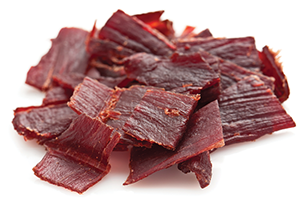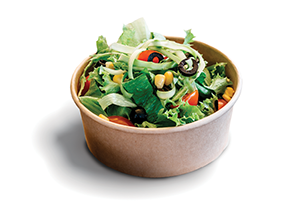 Customers at The Goods Mart store are label readers. “There’s a more conscious consumer today,” explained Rachel Krupa, owner of the New York City-based better-for-you convenience store, of her customers, many of whom are in search of low-sugar and high-protein foods and beverages that provide calming effects. As a result, “they’re reading labels and comparing items,” Krupa said.
Customers at The Goods Mart store are label readers. “There’s a more conscious consumer today,” explained Rachel Krupa, owner of the New York City-based better-for-you convenience store, of her customers, many of whom are in search of low-sugar and high-protein foods and beverages that provide calming effects. As a result, “they’re reading labels and comparing items,” Krupa said.
Indeed, the better-for-you trend continues unabated, and food-and-beverage suppliers and retailers of all stripes are leaning in. According to Jeff Church, CEO and co-founder of Rowdy Energy, marketer of functional energy drinks, consumers are increasingly seeking clean-label products and pushing brands for transparency. “Consumers want to know and understand the ingredients they’re ingesting,” said Church. “There’s an increase in focus and education around ingredients and the impact they have on health.”
This shift provides enormous opportunity for convenience stores, despite the channel’s reputation as a purveyor of indulgent and empty-calorie food and drinks. “More consumers are focused on managing chronic illnesses or the risk of them, getting better sleep, reducing stress, improving mental health or targeting specific nutrients and functional benefits,” said Mike Kostyo, trendologist at Datassential, which tracks and consults on food trends. “For c-store operators, meeting those need states and touting the beneficial nutrients and functional attributes of both food and drink are key ways to attract a larger consumer base.”
It can be a challenge for small, innovative retailers to find healthy offerings."
PANDEMIC PAUSE
Still, many consumers put enhanced focus on healthy consumables on pause as stress and uncertainty about the COVID-19 pandemic swirled. Even at Choice Market, a Denver chain with a heavy emphasis on healthy, clean and ethically sourced food and drinks, customers gravitated toward comfort foods. “We saw a shift toward things like our fried chicken sandwich at the height of the pandemic,” remarked Mike Fogarty, founder of the chain, which boasts three locations, with plans for three more to open this year. More recently though, Fogarty has seen renewed commitment among his customers toward their health goals as “people are getting back to a normal rhythm, going to the gym and doing their regular routines.”
Chad White, foodservice category manager at York, Pennsylvania-based Rutter’s, reported a similar response to the pandemic. Customers went for the “quick grab-and-go items over the healthier food options,” he said. While some Rutter’s customers continue to seek healthy food and drink alternatives, “the pandemic has altered the trends we were seeing prior to 2020,” White noted, adding, “Until customers are able to get back into a normal routine, it will be tough to determine what trends are here to stay.”
Others said that the COVID-19 pandemic has helped bolster consumer attention to leading healthy lifestyles to boost their immunity. “People are increasingly aware that what you put into your body can make you healthier and stronger and not sick,” remarked Krupa. Datassential’s Kostyo agreed. “Health and healthy eating are top priorities for many consumers post-COVID because of the evolution of their own lifestyle changes,” he said. With many people less active due to remote work and the lack of commutes, they’re anxious to get back on track, particularly if they overindulged in the early stages of the pandemic.
Health and healthy eating are top priorities for many consumers post-COVID because of the evolution of their own lifestyle changes."
POWER OF PROTEIN
Convenience retailers and suppliers report several overriding trends pertaining to healthy food and beverages. Protein-focused diets such as ketogenic (keto) have been popular for the past several years, and many c-stores have ramped up their selection of keto-friendly items such as jerky, nuts and protein packs. According to Kostyo, the keto diet has been the fastest growing diet in terms of awareness or practice since 2019, and the momentum continues today, with the term “keto” growing 63% on menus in 2021, he reported.
The keto diet has been widely apparent at Rutter’s for some time, White said, with many practitioners eschewing carbohydrates. “A number of years ago, we had customers requesting no bun on our food menu, so we added that option to our kiosks,” he reported. Keto diets have also impacted Rutter’s center-store sales, the retailer added, particularly for items like beef jerky. As a result, suppliers of keto-friendly items are making headway in c-stores. Tessemae’s buffalo ranch keto box and organic chicken avocado ranch salad kit, for example, are offered at up to 700 Circle K stores in the west, according to Genevieve Vetter, chief brand officer at the dressing and condiment marketer. Kostyo doesn’t see the keto trend vanishing anytime soon. “C-stores can capitalize on keto growth by packing more protein-forward options and placing them in more prominent store positions,” he advised.
Plant-based proteins, of course, are the latest rage, and leading QSR chains were among the first to jump on the bandwagon, with innovative c-stores following shortly thereafter. “Food is becoming more and more sophisticated, with plant-based proteins increasingly reconstructing the feel, texture and look of proteins,” remarked Fogarty from Choice Market, which offers the Impossible Burger, as well as plant-based dairy and snack alternatives. Rutter’s, meanwhile, has featured the Dr. Praeger’s Perfect Burger, a plant-based item, for two years, and according to White, “The response has been very good. We saw a lot of customer interaction with the product after it launched.” The Western c-store chain also markets the MorningStar Farms Black Bean Burger and Silk almond-based creamer is on its coffee bar. At the Goods Mart, Krupa reported that plant-based milks and snacks loaded with protein “do extremely well.”
 OPTIONS ABOUND
OPTIONS ABOUND
Emerging plant-based proteins are also capturing the interest of c-store operators. Fogarty pointed to products like plant-based bacon and tuna alternatives. “Consumers have reached a comfort level with plant-based proteins,” said Kostyo, “and in the coming years, innovation will be focused on everything from jerky to seafood. For the c-store market, plant-based jerky or charcuterie packs will be a differentiator for operators looking to put more health-forward options on the shelves.”
Beyond protein-driven demands, consumers remain interested in foods that are gluten-free, vegetarian, vegan and organic, as well as those sourced sustainably and ethically. Choice Market boasts numerous such options, including a vegan breakfast burrito, tofu, organic buffalo cauliflower and gluten-free cheese puffs. Fogarty has long been committed to offering fresh foods and ingredients, often locally sourced and sustainably raised. “Consumers are realizing that sustainability plays a role in healthy food choices,” the retailer remarked.
Among beverages, functional products are now receiving attention for their health attributes. According to Kostyo, 80% of consumers say they’re interested in functional beverages, with nearly half reporting that energy is their top desired function. Taste, low sugar, vitamins and hydration are also top-of-mind attributes, he noted. Rowdy Energy, co-founded by professional racer Kurt Busch, was designed to be a cleaner energy drink than others on the market, Church said. “We set out to create energy drinks that deliver natural caffeine without the use of artificial sweeteners, artificial ingredients or chemical preservatives,” he explained of the drink, which features caffeine derived from green tea.
Touting the beneficial nutrients and functional attributes of both food and drink are key ways to attract a larger consumer base."
PERCEPTION BATTLE
While commitment to healthy food and beverage items provides c-stores with improved margin and customer loyalty opportunities, challenges also abound. The channel’s perception as a go-to destination for unhealthy food and drink offerings is a big obstacle. “C-stores are a destination for comfort food,” remarked Heather Campbell, vice president, foodservice, at distributor S. Abraham & Sons (SAS), “so healthy food options often take a back seat.” Still, even products like “grab-and-go, single-serve fresh foods” put c-stores in the health-food game, she noted. Rutter’s White believes that for c-stores to overcome the reputation, it will require more than just offering healthy food, “but executing it well above customer expectations.
C-stores promote speed of service, and the perception is that a healthy meal can’t be fast. We focus on showing that healthy and quick service can be done right.”
Independent retailers like Krupa and Fogarty say the industry’s supply chain can also be a roadblock in store advancements toward healthy food and drinks. “Most c-stores rely on one or two wholesalers, and they don’t provide a lot of options,” the Denver retailer said. “It can be a challenge for small, innovative retailers to find healthy offerings,” added Krupa, when distribution isn’t available.
 SAS is working to expand its healthy food offerings. The company recently changed produce sourcing for its Fruit Fridge Farms salads brand from California or Mexico to Revolution Farms, located in the distributor’s home state of Michigan. According to Campbell, closer proximity in sourcing allows for a “superior, fresher product.” Marie Wise, vice president of marketing at SAS, added that the distributor will soon enter the plant-based protein segment. “This is a product we know is needed, and we’re excited to have a wide variety of lines coming into the market and helping to fill that need,” she remarked.
SAS is working to expand its healthy food offerings. The company recently changed produce sourcing for its Fruit Fridge Farms salads brand from California or Mexico to Revolution Farms, located in the distributor’s home state of Michigan. According to Campbell, closer proximity in sourcing allows for a “superior, fresher product.” Marie Wise, vice president of marketing at SAS, added that the distributor will soon enter the plant-based protein segment. “This is a product we know is needed, and we’re excited to have a wide variety of lines coming into the market and helping to fill that need,” she remarked.
Just as with fresh foods, inevitable success with healthy foods for c-stores requires a time commitment. “We’ve seen keto and gluten-free be the most significant health trends for us, along with plant-based options,” said White. “That being said, these trends take some time to play out and gain traction with our customer base. We have a focus on these healthy options, and as we see these trends moving to our customer base, we will continue to grow these options.”
Consumer demand for healthy food and drinks isn’t going away, and marketers will continue to respond. PepsiCo, for instance, is expected to release new plant-based snacks and drinks through its joint venture with Beyond Meat. And Kostyo expects increased interest in food and drinks that offer support for mental health, including functional beverages with adaptogens and CBD options. For retailers not yet committed to the healthy foods space, it may be time to shed the dated perception that c-stores offer only unhealthy foods and invest in the future.